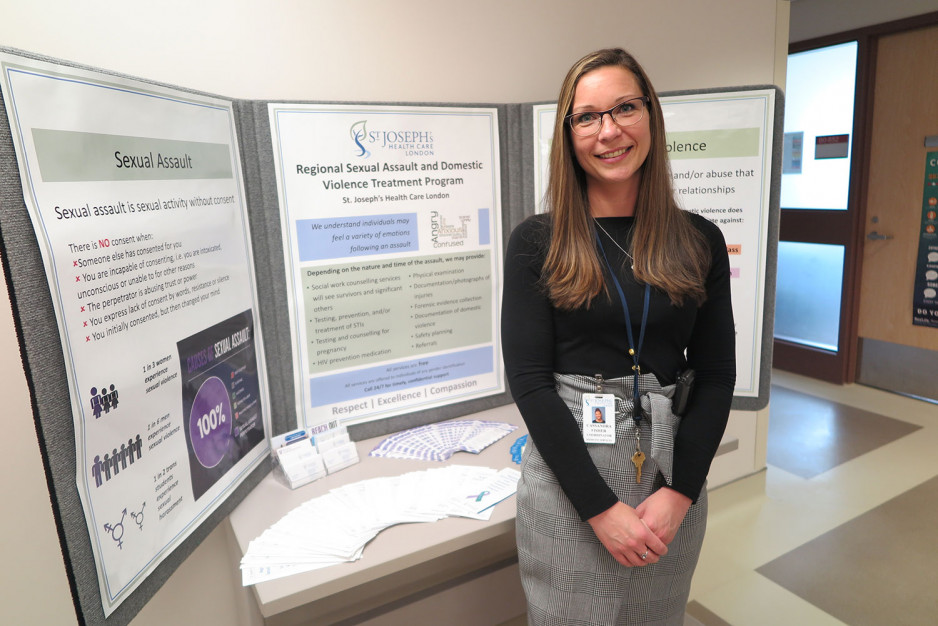Western University and St. Joseph’s partnership augments violence-survivor services
St. Joseph’s Regional Sexual Assault and Domestic Violence Treatment Program team will provide additional on-campus care to students.
A new partnership between Western University and the Regional Sexual Assault and Domestic Violence Treatment Program of St. Joseph’s Health Care London will provide additional support on Western’s campus to students who have experienced sexual assault or domestic violence, with 24/7 services as needed.
“This complements the survivor supports Western has in place in that we will add more specially trained, compassionate support after hours and on weekends, in an environment where survivors are most comfortable,” says Terry McQuaid, Western’s Director of Wellness and Well-being and Co-Chair of the university’s Gender-based and Sexual Violence Action Committee.
“The St. Joseph’s program has an outstanding reputation and we’re really pleased we can forge a partnership that builds on trauma-informed pathways for survivors of violence,” Terry says.
The St. Joseph’s team of specialized nurses, doctors and social workers provides care to people of any age, gender or sexual identity experiencing sexual assault and/or domestic violence.
Now, in addition to offering those services at the St. Joseph’s Hospital site, the team will make itself available – at no charge to clients – to come to campus as needed and requested, says Cassie Fisher, Coordinator, Medicine Services at St. Joseph’s.
“Previously, a student who disclosed violence and was directed to the program would travel, often on their own, to our clinic – a location and environment that were foreign to them – sometimes only hours after the trauma occurred,” Cassie says. “This agreement with Western allows the nurses to meet the students where they are, discuss options of care and support them back to the program if or when needed. The survivor knows that whatever care path they choose, they are not doing it alone.”
Available supports can include (at the client’s choice): emotional support and crisis intervention; physical examination; testing, prevention, and/or treatment of sexually transmitted infections; HIV prevention medication; testing and/or prevention of pregnancy due to sexual assault; documentation/photographs of injuries and forensic evidence collection; safety planning; and/or referrals as needed
“Our hope is that this new model of care will support survivors to feel safer in disclosing and seeking the support and care they need,” adds Cassie. "Coming forward with a discloser of sexual assault or domestic violence is extremely difficult. All of the unknowns of what those next steps will look like are often scary for the survivor. Now, students can receive specialized care where ever they feel most safe - onsite at Western or within our program at St. Joseph's Hospital."
Western has in place a survivor-centric process to help people disclose violence, file a complaint and/or seek support; and a policy to address and prevent gender-based sexual violence (GBSV).
The partnership with St. Joseph’s is the latest in a series of commitments Western has made to address GBSV including the establishment of an action committee on GBSV; new residence health and safety advisors, mandatory sexual violence awareness and prevention training for students in residence and on-campus security enhancements.
Do you need support?
The Regional Sexual Assault and Domestic Violence Treatment Program at St. Joseph’s Hospital provides care in the region for people of any age, gender or sexual identity experiencing sexual assault and/or domestic violence. A team of specialized nurses, doctors and social workers are available 24/7 to provide care at the time of the assault and in the months following the incident. Depending on the nature of the assault and the time since the assault, numerous services are offered:
• Medical treatment and follow up care
• Forensic collection
• Documentation
• Counseling
• Safety planning
• Referral to supporting community agencies
• Primary care
• Consultation with other health care professionals
• Support with contacting police services
• Support contacting victim services
• Education and presentations to community agencies and schools
To access the program:
• Call the program at any time, day or night, at 519-646-6100, ext. 64224
• Go to St. Joseph’s Urgent Care Centre or any emergency department in London, Middlesex, Oxford, or Elgin Counties and ask to speak to the nurse on call for sexual assault/domestic violence.
